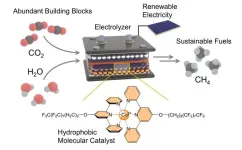(Press-News.org) Researchers at Oxford Brookes University have pioneered a groundbreaking method to tackle one of the world’s most persistent environmental threats—toxic chemicals in global water supplies.
They have developed a new machine called a hydrodynamic reactor that uses bubbles which form and collapse due to changes in pressure, a process called cavitation. The reactor removes toxic per- and poly-fluoroalkyl substances (PFAS), also known as “forever chemicals” from water.
PFAS chemicals were invented in the 1930s and used in convenience products like waterproof clothing, pizza boxes, nonstick pans, and stain-resistant carpets. Concerns were raised about these chemicals being toxic in the 1970s and confirmed by scientists in the early 2000s. They have been found to be a health hazard that has infiltrated water supplies worldwide. The chemicals are associated with diseases such as ulcerative colitis, thyroid problems, elevated cholesterol, liver damage, and cancer.
Removing PFAS chemicals from water sources is a global challenge. They are released into water sources through industry wastewater, landfills containing contaminated products, domestic wastewater, sewage and agricultural run-off.
Professor Iakovos Tzanakis, who specialises in Engineering Materials at Oxford Brookes and is one of the lead researchers, said: “Once contaminated water is released into rivers, lakes and seas, it eventually infiltrates our public water supplies, including our domestic drinking water. Our challenge has been to find a way of effectively treating water to remove PFAS chemicals sustainably and at a scale.”
In the UK the Royal Society of Chemists has launched a campaign to reduce the levels of PFAS in our water supplies. The EU is planning to restrict the use of PFAS chemicals with new rules introduced in 2024. In America, legally enforceable PFAS levels have also been established to protect public safety.
Professor Tzanakis said: “Until now, methods of removing PFAS from water have been costly and time-consuming using chemicals and restricted to laboratory scale. But research I have carried out with my colleague Dr Morteza Ghorbani has identified a potential solution.”
Professor Tzanakis and Dr Ghorbani, a Royal Society-Newton Fellow at Oxford Brookes, collaborated with Sabanci University (Turkey), white goods manufacturer Beko (Turkey), KTH Royal Institute of Technology (Sweden), and IVL Swedish Environmental Research Institute to develop and test the hydrodynamic cavitation reactor.
The reactor uses fast-moving liquid in tiny spaces to create and pop lots of small bubbles - a process that helps to clean the water.
Professor Tzanakis said: "This technology has the potential to revolutionise wastewater treatment, making it safer and more sustainable for communities around the globe. The advancements in green hydrodynamic cavitation provide a scalable alternative to current methods, overcoming its limitations.”
When the eco-friendly and energy-efficient hydrodynamic cavitation reactor was tested at the Hammarby Sjöstad wastewater treatment plant in Sweden, the results were far better than expected.
The reactor achieved nearly a 36% degradation rate of 11 common PFAS variants in just 30 minutes and didn’t need additional chemicals.
Dr Ghorbani, who is also affiliated to Sabanci University, said: “The results were impressive. We didn’t expect that level of PFAS processing in such a short space of time. We are now exploring the fundamental mechanisms of PFAS removal in depth at Oxford Brookes University to better control and optimise the process.
“Our next step is scaling up our reactor to treat larger volumes of wastewater containing PFAS. We are aiming to treat wastewater containing PFAS volumes up to 20 litres. The reactor for this has already been built. After that, our target is to treat volumes up to 200 litres in a wastewater treatment plant in Sweden.
“Our goal is to boost this promising approach by unveiling the intricate physics that drive the technology through the use of various reactors in different countries. We want to ensure this technology is ready for actual wastewater treatment in the near future and as set by EU 2035 strategy when all PFAS-containing waste must be treated.”
This research has been published in the Chemical Engineering Journal, and has already received a prestigious award from the British Council in collaboration with Sabanci University to enable the team to continue their work.
Ends
About Oxford Brookes University
www.brookes.ac.uk
Oxford Brookes is one of the UK's leading modern universities, and is amongst the world’s top universities in 21 subject areas. Set in a world-famous student city, it enjoys an international reputation for teaching excellence as well as strong links with business, industry and the public sector.
Media Contacts:
pr@brookes.ac.uk / 01865 484 454
END
Groundbreaking wastewater treatment research led by Oxford Brookes targets global challenge of toxic ‘forever chemicals’
2024-10-04
ELSE PRESS RELEASES FROM THIS DATE:
Jefferson Health awarded $2.4 million in PCORI funding
2024-10-04
PHILADELPHIA, Oct. 3, 2024 — Jefferson Health has been awarded $2.4 million by the Patient-Centered Outcomes Research Institute (PCORI) to implement evidence-based patient education and coaching programs for weight loss across Jefferson Primary Care.
U.S. adult obesity rates have risen to over 40% in the past two decades, increasing risks of diabetes, heart disease and premature death. Led by Baligh Yehia, M.D., MPP, MSHP, President of Jefferson Health, this project will implement sustainable health education programs ...
Cilta-cel found highly effective in first real-world study
2024-10-04
(WASHINGTON – October 4, 2024) In the first study to report real-world outcomes from ciltacabtagene autoleucel (cilta-cel), a chimeric antigen receptor (CAR)-T therapy for multiple myeloma, patients experienced efficacy and safety results similar to those seen in clinical trials, according to results published today in Blood.
Of 236 patients who received cilta-cel infusions at 16 U.S. medical centers in 2022, 89% saw their cancer respond to the treatment and 70% had a complete response, meaning there was no detectable cancer after the treatment. These numbers ...
Unleashing the power of generative AI on smart collaborative innovation network platform to empower research and technology innovation
2024-10-04
A dedicated team of researchers from City University of Hong Kong (CityUHK) is pioneering cutting-edge generative artificial intelligence (GenAI) technologies on a collaborative innovation network platform, aimed at transforming science, technology and innovation (STI) services to empower research and innovation. This innovative project is set to revolutionise the related service delivery by creating a secure GenAI model and digitally transforming processes, thereby facilitating research development and technology innovation, while enhancing data security and service efficiency.
STI services, including ...
Revolutionizing cardiovascular risk assessment with AI
2024-10-04
A recent position paper in the Asia-Pacific Journal of Ophthalmology explores the transformative potential of artificial intelligence (AI) in ophthalmology. Led by Lama Al-Aswad, Professor of Ophthalmology and Irene Heinz Given and John La Porte Given Research Professor of Ophthalmology II, of the Scheie Eye Institute, the work represents a collaboration among researchers from Penn Engineering, Penn Medicine, the University of Michigan Kellogg Eye Center, St. John Eye Hospital in Jerusalem, and Gyeongsang National University College of Medicine in Korea.
With fundus photography enabling the visualization ...
Antarctic ‘greening’ at dramatic rate
2024-10-04
Vegetation cover across the Antarctic Peninsula has increased more than tenfold over the last four decades, new research shows.
The Antarctic Peninsula, like many polar regions, is warming faster than the global average, with extreme heat events in Antarctica becoming more common.
The new study – by the universities of Exeter and Hertfordshire, and the British Antarctic Survey – used satellite data to assess how much the Antarctic Peninsula has been “greening” in response to climate change.
It found that the area of vegetation ...
Winds of change: James Webb Space Telescope reveals elusive details in young star systems
2024-10-04
Every second, more than 3,000 stars are born in the visible universe. Many are surrounded by what astronomers call a protoplanetary disk – a swirling "pancake" of hot gas and dust from which planets form. The exact processes that give rise to stars and planetary systems, however, are still poorly understood.
A team of astronomers led by University of Arizona researchers has used NASA's James Webb Space Telescope to obtain some of the most detailed insights into the forces that shape protoplanetary disks. The observations offer glimpses into what our solar system may have looked like 4.6 billion years ago.
Specifically, the team was able to trace so-called ...
UC Merced co-leads initiative to combat promotion and tenure bias against Black and Hispanic faculty
2024-10-04
Black and Hispanic faculty members seeking promotion at research universities face career-damaging biases, with their scholarly production judged more harshly than that of their peers, according to a groundbreaking initiative co-led by the University of California, Merced that aims to uncover the roots of these biases and develop strategies for change.
Junior professors are generally evaluated and voted on for promotion and tenure by committees comprising senior colleagues. In one of the studies conducted by the research team, results suggest that faculty from underrepresented minorities received 7% more negative votes from ...
Addressing climate change and inequality: A win-win policy solution
2024-10-04
Climate change and economic inequality are deeply interconnected, with the potential to exacerbate each other if left unchecked. A new study published in Nature Climate Change sheds light on this critical relationship using data from eight large-scale Integrated Assessment Models (IAMs) to examine the distributional impacts of climate policies and climate risks. The study provides robust evidence that climate policies aligned with the Paris Agreement can mitigate long-term inequality while addressing climate change.
Led by Johannes Emmerling, Senior Scientist at the Euro-Mediterranean ...
Innovative catalyst produces methane using electricity
2024-10-04
Researchers at the University of Bonn and University of Montreal have developed a new type of catalyst and used it in their study to produce methane out of carbon dioxide and water in a highly efficient way using electricity. Methane can be used, for example, to heat apartments or as a starting material in the chemical industry. It is also the main component of natural gas. If it is produced using green electricity, however, it is largely climate neutral. The insights gained from the model system studied by the researchers can be transferred to large-scale technical ...
Liver X receptor beta: a new frontier in treating depression and anxiety
2024-10-04
Houston, Texas – In a state-of-the-art Bench to Bedside review published in the journal Brain Medicine (Genomic Press), researchers Dr. Xiaoyu Song and Professor Jan-Åke Gustafsson from the University of Houston and Karolinska Institutet (Sweden) shed light on the therapeutic potential of liver X receptor beta (LXRβ) in treating depression and anxiety. This comprehensive analysis marks a significant step forward in understanding the molecular underpinnings of mental health disorders and potentially revolutionizing their treatment.
LXRβ, a nuclear receptor initially known for its role in cholesterol metabolism and inflammation, is now emerging as a crucial ...



